Latest DePIN News
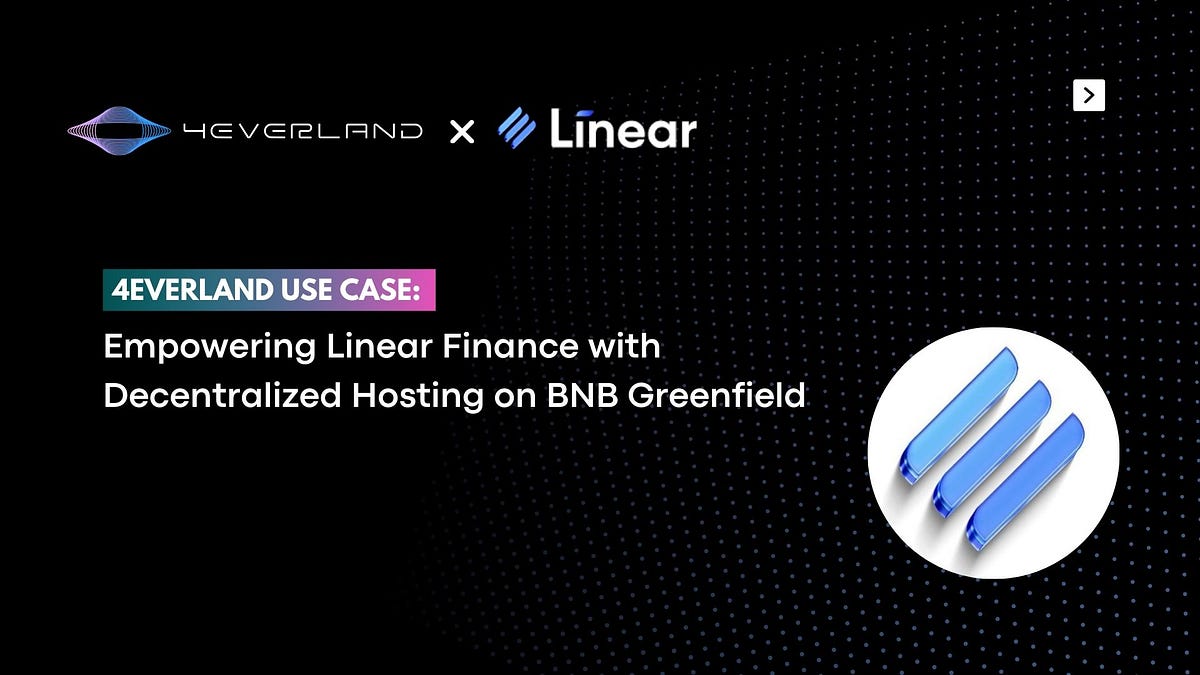
a year ago
Linear Finance Leverages 4EVERLAND Hosting for Enhanced DeFi Solutions
In the rapidly evolving landscape of decentralized finance (DeFi), Linear Finance has emerged as a significant player by integrating with 4EVERLAND Hosting to decentralize its website and decentralized applications (dApps) on BNB Greenfield. This strategic move enhances the scalability, security, and performance of Linear Finance's platform, allowing it to bridge real-world assets with blockchain technology. As a cross-chain compatible synthetic asset protocol, Linear Finance enables users to trade synthetic assets, known as "Liquids," that mirror traditional financial assets, thus providing a solution that transcends the limitations of the conventional financial system.
The foundation of the Linear Finance ecosystem is its utility token, LINA, which serves both as collateral for synthetic assets and as a governance token. LINA holders can participate in decision-making processes regarding collateral ratios, fee structures, and asset listings. Key components of the ecosystem include the Linear Builder, which allows users to manage collateral pools and create Liquids, and the Linear Bridge, which facilitates cross-chain interactions. Additionally, the Linear Exchange dApp offers near-instantaneous settlement of synthetic assets, enhancing user experience by eliminating order books and relying on smart contracts backed by a debt pool.
The integration of 4EVERLAND Hosting empowers Linear Finance by providing decentralized deployment solutions that enhance functionality and security. With features like global access through a distributed content delivery network (CDN) and automated operations tools, 4EVERLAND mitigates risks associated with centralized servers. This partnership not only fortifies Linear Finance's platform but also exemplifies the advantages of decentralized hosting solutions in the DeFi space, paving the way for innovative and reliable financial ecosystems in the future.

a year ago
Storj Team Deposits $3M in Tokens on Binance Amid Bullish Market
The altcoin market has recently experienced a bullish trend, prompting the Storj team to make significant deposits on Binance. They have deposited 5 million tokens, valued at approximately $3 million, through GSR markets. This strategic decision follows a notable 24% surge in the price of Storj tokens, indicating a calculated move by the team to capitalize on favorable market conditions. The deposits are part of a broader strategy that the team initiated seven months ago, reflecting their ongoing commitment to leveraging market opportunities.
Historically, the Storj team has demonstrated a pattern of depositing tokens on Binance during bullish phases. Between November 2023 and March 2024, they deposited a substantial 37.9 million Storj tokens, which were valued at an average price of $0.809, totaling around $30.6 million. This previous strategy appears to be influencing their current actions, as they aim to maximize their holdings and potentially enhance liquidity in the market.
As the altcoin market continues to evolve, the actions of the Storj team serve as a reminder of the importance of strategic planning in cryptocurrency investments. Their recent deposits may not only reflect confidence in the future performance of Storj but also highlight the broader trends within the altcoin sector. Investors and market observers will be keen to see how these moves impact the price and trading volume of Storj tokens in the coming weeks.
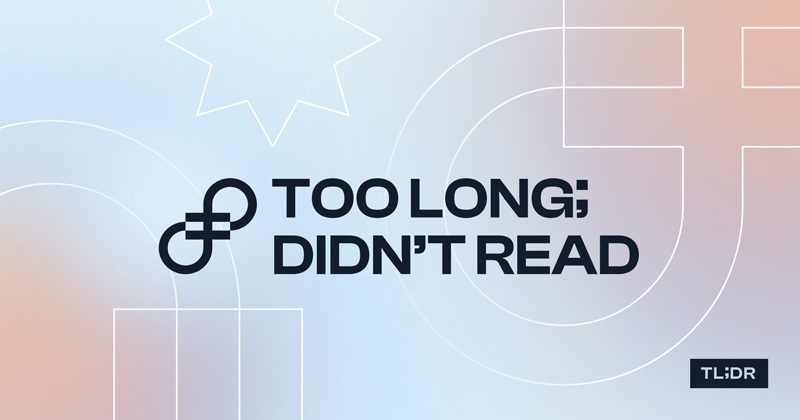
a year ago
The Evolution of Layer 2 Solutions and Decentralized Cloud Services on Filecoin
The landscape of Layer 2 solutions on Filecoin is evolving rapidly, with innovations such as Basin, Akave, and Storacha Network leading the charge. These advancements are crucial for enhancing decentralized storage and data management capabilities. By leveraging Layer 2 technologies, Filecoin aims to improve transaction speeds and reduce costs, making it more accessible for developers and users alike. This evolution not only addresses current limitations but also sets the stage for a more robust ecosystem that can support a wider range of applications in the future.
In addition to Layer 2 solutions, the introduction of Filecoin Web Services (FWS) marks a significant step towards redefining decentralized cloud services. Nicola Greco from FilOz emphasizes the importance of creating a composable ecosystem that extends beyond mere storage solutions. This initiative aims to integrate various services, enabling developers to build more complex and interconnected applications. By fostering collaboration within the ecosystem, FWS is poised to enhance the overall utility of Filecoin, attracting a broader audience and encouraging innovation.
As Filecoin continues to chart its course in the decentralized storage space, it is essential to monitor the progress of these initiatives. The Filecoin community recently celebrated the first anniversary of the Filecoin Virtual Machine (FVM), which has introduced programmability to its verifiable storage. This milestone has not only enriched the DeFi landscape on Filecoin but has also highlighted the platform's potential for growth. With over $500 million in Total Value Locked (TVL) in Liquid Staking alone, the future looks promising for Filecoin as it navigates the complexities of decentralized technology and market demands.

a year ago
AI-Driven Coins Surge as IntelMarkets Leads the Charge
The cryptocurrency market is currently witnessing a significant surge in AI-driven coins, with IntelMarkets (INTL) leading the charge in presale success. This emerging coin has attracted considerable attention, raising over $1.1 million at a presale price of just $0.027. Market analysts predict a potential price increase of up to 1,000% in the coming months, highlighting the growing interest in AI technologies within the crypto space. Alongside INTL, Near Protocol (NEAR) and Bittensor (TAO) are also experiencing impressive gains, with NEAR trading at $4.99 after a notable recovery from a low of $3.25. This trend suggests a shift in market dynamics, with AI coins poised to challenge established players like Cardano (ADA).
Cardano (ADA) is currently facing a downturn, struggling to maintain its value amidst a bullish market. The coin has seen a minor increase of only 3%, trading at $0.36, but has experienced significant fluctuations, dropping as low as $0.3434. The persistent red candles on the weekly charts indicate a bearish trend, with a monthly decline of 2%. As the market shifts towards AI-driven projects, Cardano's position may be threatened, prompting investors to reassess their strategies in light of these emerging competitors.
The IntelMarkets platform aims to revolutionize cryptocurrency trading by providing retail traders with advanced tools and features designed to simplify decision-making. Utilizing a dual architecture on Ethereum and Solana blockchains, IntelMarkets leverages over 100,000 inputs to generate a single trade signal, enhancing the trading experience. As the demand for efficient and cost-effective trading solutions grows, IntelMarkets is well-positioned to capitalize on this trend, potentially reshaping the landscape of cryptocurrency trading platforms.
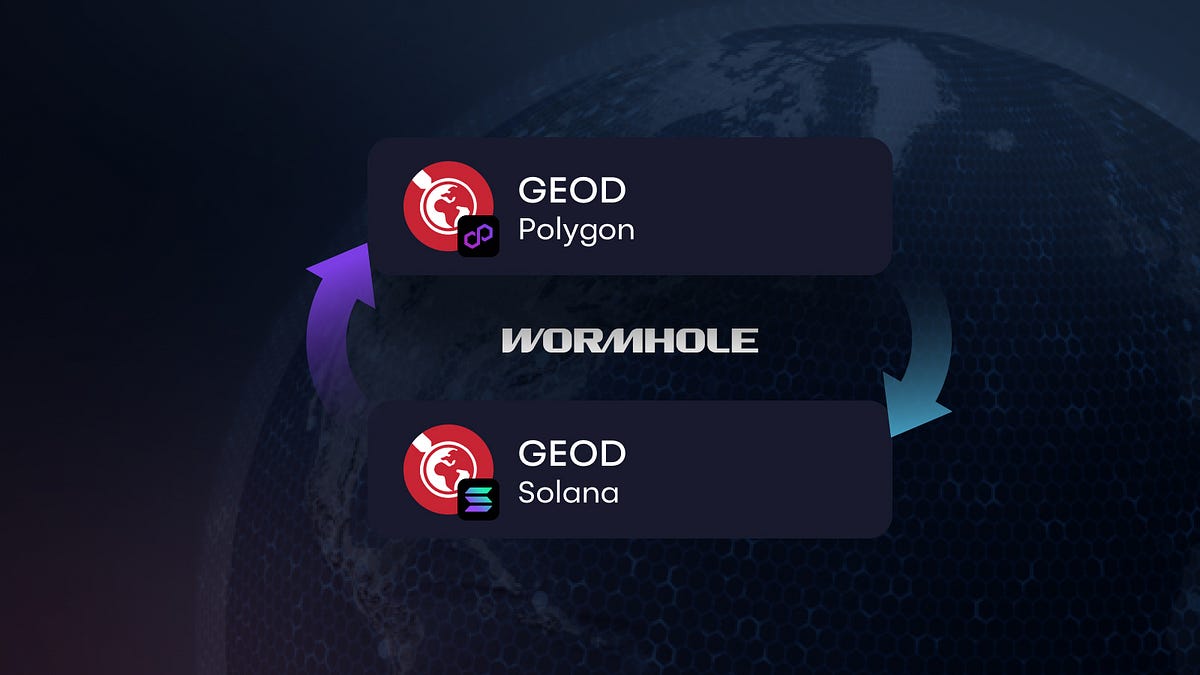
a year ago
GEODNET Expands to Solana: A New Era for GEOD Token
GEOD, the native utility token of the GEODNET network, is making significant strides by going multichain to Solana through the Wormhole Native Token Transfer (NTT) framework. This transition was solidified by a governance vote that saw a 99% approval for the creation of the SPL token, as outlined in GEODNET Improvement Proposal #3 (GIP3). The GEOD token is integral to the network, rewarding Base Station hosts for mining satellite signal data and being utilized by customers through a purchase and burn mechanism. The Polygon-based GEOD token will remain active for satellite mining, while the new Solana token is expected to enhance the network's capabilities and reach.
The introduction of the Solana-based GEOD token is anticipated to provide numerous benefits for the GEODNET community, including enhanced service utility through the integration of multiple Solana DePIN protocols. This will facilitate essential services such as communication and mapping protocols, which are crucial for autonomy. Additionally, GEODNET is launching a Mobile SDK and applications, including the GEO-PULSE app, that will align with Solana's mobile initiatives. This move is seen as pivotal for fostering an open and decentralized mobile internet, countering the existing duopoly of the Android Play and Apple Store.
To facilitate the transition and increase liquidity, GEODNET has implemented an in-app bridge powered by Wormhole, allowing seamless token transfers between networks. Initial transfer limits are set to 100,000 GEOD tokens to manage risk while liquidity grows. Trading pairs for GEOD/SOL are already live on platforms like Orca and Raydium, with expectations for market-making support to enhance trading activity. The Foundation is also exploring broader multichain support, including the potential for satellite mining rewards on Solana, ensuring that the community remains informed about future developments and utility enhancements for the GEOD token.
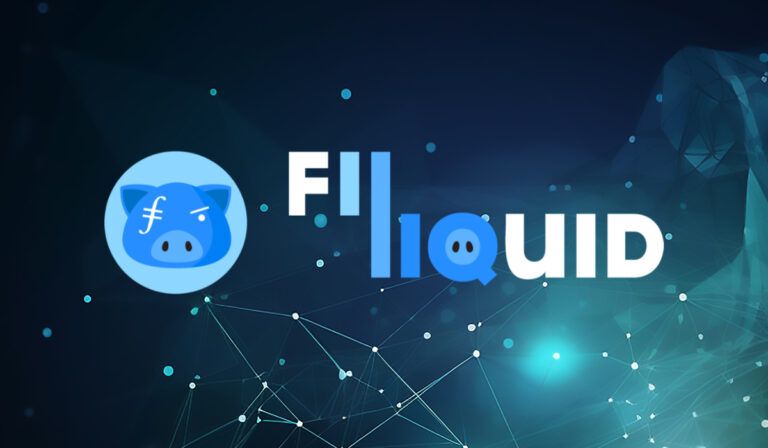
a year ago
FILLiquid Launches FIG Staking to Enhance Revenue Sharing in Filecoin Ecosystem
FILLiquid, a new platform based on Filecoin, has recently launched FIG Staking, allowing users to earn yield by staking its governance token, FIG. This innovative product employs a revenue-sharing model that enhances the utility of the FIG token, enabling holders to claim a portion of the platform's transaction fees. Since the launch of FILLiquid's FIL liquidity protocol in August 2024, the platform has rapidly gained traction, amassing over $2.5 million in Total Value Locked (TVL). The FIG Staking launch saw nearly 1 million $FIG staked within just two hours, indicating strong interest from the community in engaging with the protocol more deeply.
The introduction of FIG Staking not only broadens the use of the FIG token beyond governance but also provides stakers with access to transaction-based revenue. Users can participate by depositing FIG into the staking product, with rewards accumulating as more transactions and loans occur on the platform. The staking process requires users to choose a deposit period, with longer commitments yielding higher rewards. The initial dividends will be distributed manually on specific dates, offering FIG holders multiple opportunities to begin staking and benefit from the platform's growth.
FILLiquid aims to solidify its position within the Filecoin ecosystem by enhancing liquidity for storage providers, thereby promoting sustainable storage power growth. The protocol's algorithmic interest rate model is designed to unlock liquidity for storage providers, addressing the challenges they face in making consistent FIL pledges. With a team experienced in the crypto space and a proven track record, FILLiquid is poised to become a significant player in the DeFi landscape, providing innovative solutions for both token holders and storage providers alike.

a year ago
Recent Developments in Decentralized Physical Infrastructure Networks
Decentralized Physical Infrastructure Networks (DePin) are making significant strides in the tech industry by facilitating decentralized projects that focus on real-world infrastructure. Recently, the DePin sector has seen notable developments, including the listing of the GRASS token on OKX's pre-market futures platform. This allows users to trade USDT-margined futures on the GRASS token, which is the native asset of the Grass project. The futures went live on October 14, 2024, enabling users to monetize unused bandwidth by selling it to vetted companies, thereby creating a fairer marketplace for proxy services. Additionally, the Grass Foundation is set to release a checker for its highly anticipated “Airdrop One” on October 21, 2024, marking it as potentially the most widely distributed airdrop in crypto history.
In another significant move, Aethir, a decentralized GPU-as-a-service network, announced the launch of a $100 million Ecosystem Fund aimed at fostering AI and cloud gaming initiatives. A substantial portion of this fund will be directed towards the Aethir Catalyst program, which offers grants ranging from $5,000 to $200,000 to emerging developers. This initiative not only provides financial backing but also grants access to Aethir's extensive GPU resources, enabling developers to create decentralized cloud-based games and integrate AI solutions. Aethir's strategic investment in this area reflects its commitment to enhancing its presence in the rapidly growing cloud gaming and AI sectors.
Analytics platform LunarCrush has also highlighted the top DePIN projects based on social media mentions, with Bittensor (TAO) leading the pack with 10,880 mentions, indicating a surge in community interest. MultiversX (EGLD) and ICP (Internet Computer Protocol) followed, showcasing their growing presence in the decentralized infrastructure space. While DePIN is still evolving and faces challenges, it plays a crucial role in bridging the gap between synthetic and real-world assets, thereby supporting traditional infrastructure in areas where conventional models fall short.

a year ago
The Rise of Confidential AI: Ensuring Trust and Security in AI Applications
Artificial Intelligence (AI) has evolved into a crucial asset for organizations, with three-quarters now leveraging it to enhance innovation, efficiency, and growth. Analysts predict that by 2026, 80% of enterprises will utilize AI-enabled applications, significantly transforming various industries. The marketing and advertising sectors are at the forefront, using AI to secure a competitive edge. However, as AI becomes more prevalent, concerns regarding data confidentiality arise, particularly regarding the use of sensitive business and personal information in training AI systems. Ensuring confidentiality is vital not only for security but also for building trust and fairness in AI-driven decisions.
The challenges of AI, often referred to as the "black box problem," highlight the need for transparency in AI systems. Users frequently struggle to understand how AI makes decisions, raising concerns about accountability and ethical standards. Privacy issues are compounded by the handling of personal data, and data sovereignty becomes a critical consideration, especially with cross-border data flows. As AI increasingly influences our lives, companies face the dual challenge of ensuring security while also finding ways to monetize AI applications without compromising user privacy. Confidential AI emerges as a solution to these challenges, emphasizing secure data handling and decision-making processes.
At iExec, the focus on confidential computing ensures that sensitive data remains protected throughout the AI workflow. By utilizing blockchain technology, iExec enhances the verifiability and trustworthiness of AI processes, allowing stakeholders to track each step and verify results. This integration of Confidential AI with blockchain not only safeguards data but also provides a framework for monetizing AI applications while maintaining user privacy. As advancements continue in this field, the future of Confidential AI looks promising, with ongoing developments aimed at enhancing security, transparency, and ethical considerations in AI applications.
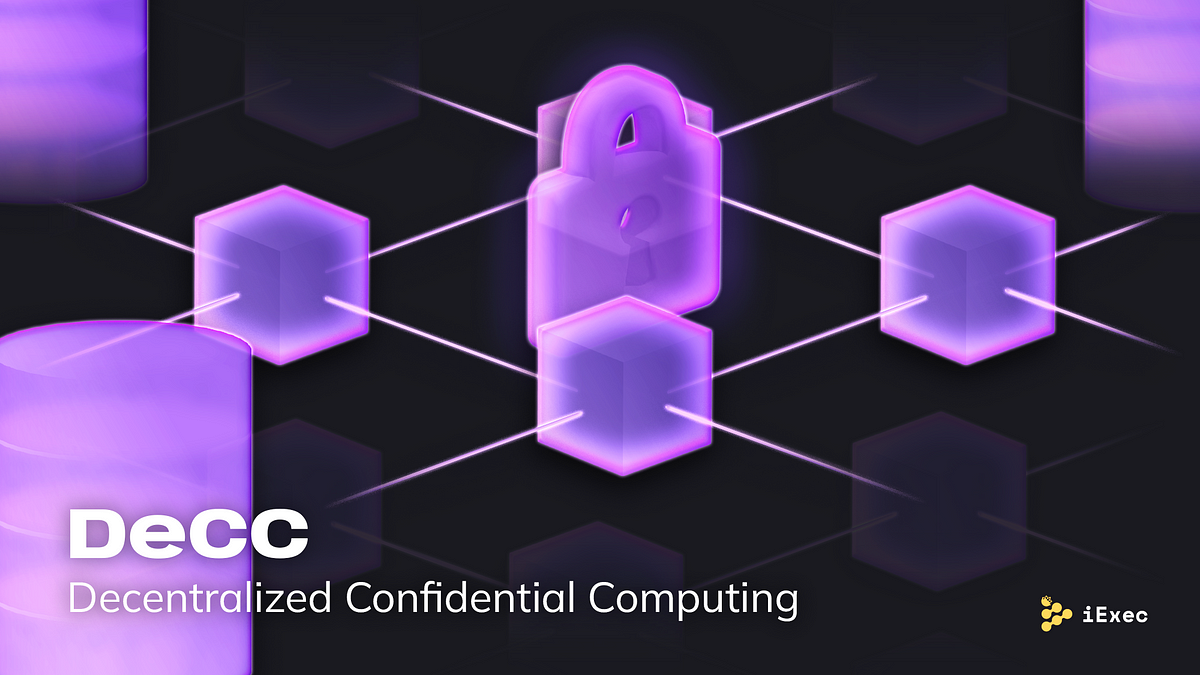
a year ago
iExec: Pioneering Decentralized Confidential Computing in Web3
As Decentralized Confidential Computing (DeCC) gains traction in 2024, iExec has been a pioneer in this domain, merging Confidential Computing with blockchain since 2018. Collaborating with Intel, iExec launched the first Trusted Compute Specification for the Ethereum Enterprise Alliance, laying the groundwork for secure data processing in Web3. By 2019, iExec became the first Web3 company to join the Confidential Computing Consortium, solidifying its role in decentralized data protection. These early innovations have paved the way for DeCC, which redefines data privacy and security in the Web3 landscape.
Confidential Computing is a critical component of DeCC, addressing the need to protect data not only at rest and in transit but also during processing. This technology isolates sensitive data or code using hardware enclaves, creating a trusted execution environment that processes encrypted data in memory. By employing hardware-based attestation reports, Confidential Computing ensures that only authorized programs can access the data within these enclaves. This approach safeguards various types of data, from personal information to complex algorithms, enhancing security in an increasingly fragmented data landscape.
The DeCC movement promotes a broader understanding of privacy in Web3, emphasizing user control and decentralized security. With the formation of the DeCC Alliance, which includes leading projects in Confidential Computing, the initiative aims to educate the public on the capabilities of DeCC and its necessity for secure data usage. iExec's mission is to empower users by tokenizing their data and establishing governance rules, ensuring that data remains secure and private. As DeCC continues to evolve, it is set to transform the Web3 ecosystem, making privacy and data ownership a fundamental right for users in the digital age.

a year ago
Meta Unveils Movie Gen: A New Era in AI Video Generation
Meta has made a significant leap into the realm of AI video generation with the unveiling of Movie Gen, a cutting-edge tool designed to create high-quality videos and audio. This innovative platform allows users to engage in complex visual effects tasks such as environment replacement, character swapping, and object removal. Movie Gen not only matches the video quality of competitors like OpenAI's Sora but also enables users to upload their own images and integrate them into the generated content. The tool aims to democratize creative expression, providing opportunities for those who may not have access to traditional video production resources.
At the core of Movie Gen are foundational models that utilize advanced techniques to generate 1080p HD videos and synchronized audio. The system is built on a Transformer architecture, employing flow matching during training to enhance performance. Meta's approach involves pre-training on extensive datasets followed by fine-tuning to ensure realistic outputs. The tool's capabilities include text-to-video generation, precision video editing, and the creation of personalized videos, making it a versatile asset for both amateur and professional creators.
While still in the research phase, Movie Gen has already demonstrated impressive results in comparison to existing commercial systems. Meta's extensive training data and innovative training methods contribute to its superior performance. As the company collaborates with creative professionals to refine the tool, the anticipation for its public release grows. If successfully launched, Movie Gen could revolutionize the video generation landscape, challenging established players and opening new avenues for creativity in the digital space.
Signup for latest DePIN news and updates